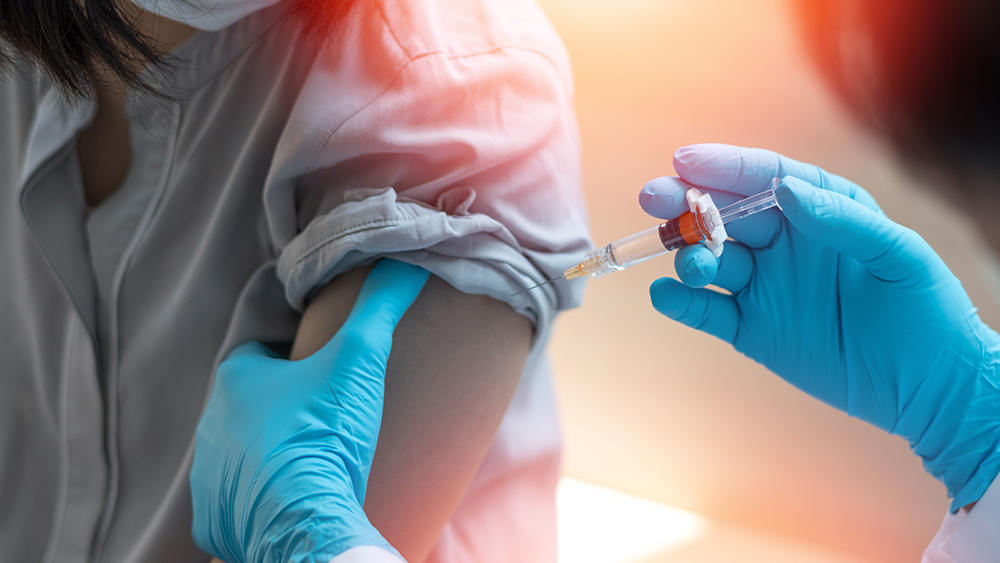More people develop blood clots after receiving the Janssen COVID-19 vaccine
04/14/2021 / By Nolan Barton

The European Medicines Agency (EMA) on Friday, April 9, said that one person died after having received Johnson & Johnson’s Wuhan coronavirus (COVID-19) vaccine, also known as the Janssen vaccine. The person was one of four patients who had developed unusual blood clots after receiving the vaccine.
“Four serious cases of unusual blood clots with low blood platelets have been reported post-vaccination with COVID-19 vaccine Janssen. One case occurred in a clinical trial and three cases occurred during the vaccine rollout in the United States. One of them was fatal,” the agency said in a statement.
Janssen is a subsidiary of Johnson & Johnson.
Janssen COVID-19 vaccine rollout in EU faces further delay
This development could further delay the rollout of the Janssen COVID-19 vaccine in the European Union. It was authorized in the EU on March 11 but the rollout of the shots has not started yet. The U.S. authorized the Janssen shot in late February and has administered nearly 5 million doses as of Thursday morning, April 8.
According to the EMA, it is still not clear yet whether there is a causal association between the vaccine and the blood clots. The EU’s top drug regulator will probe the cases and decide whether or not regulatory action is necessary.
Food and Drug Administration (FDA) documents detailing why it decided to authorize the Janssen shot include notes on a small number of patients developing blood clots after vaccination in a late-stage clinical trial. (Related: Johnson & Johnson’s aborted baby Covid-19 vaccine harms trial participant.)
The FDA said the causal relationship with the vaccine could not be determined because “the assessment of causality was confounded by the presence of underlying medical conditions that may have predisposed individuals to these events.”
Johnson & Johnson told the Epoch Times via email that it prioritizes the safety and well-being of people who use its products and that the company shares with health authorities all adverse event reports post-vaccination, along with its own assessment of each report.
“We are aware that thromboembolic events including those with thrombocytopenia have been reported with all COVID-19 vaccines. Our close tracking of side effects has revealed a small number of very rare events following vaccination. At present, no clear causal relationship has been established between these rare events and the Janssen COVID-19 vaccine,” Johnson & Johnson said.
The New Jersey-based pharmaceutical company added: “We continue to work closely with experts and regulators to assess the data and support the open communication of this information to healthcare professionals and the public to help ensure that, in the event of a very rare illness, appropriate steps can be taken for quick diagnosis and treatment.”
Johnson & Johnson said anyone who would experience symptoms such as swelling, shortness of breath and neurological difficulties after vaccination should immediately seek medical assistance.
EMA being cautious with Janssen following blood clot issues with AstraZeneca jab
The EMA is being cautious with the Janssen COVID-19 vaccine after more than a dozen European countries halted their AstraZeneca vaccine rollouts because of clotting issues last month. The drug regulator investigated 44 reports of an extremely rare brain clotting ailment known as cerebral venous sinus thrombosis (CVST) on people who received the AstraZeneca COVID-19 vaccine.
On Wednesday, April 7, the EMA issued a statement saying that there is a “possible link” between the AstraZeneca COVID-19 vaccine and rare blood clots. (Related: New research points to link between AstraZeneca vaccine and blood clots.)
In the statement, the EMA reminded healthcare professionals and people receiving the vaccine to remain aware of the possibility of very rare cases of blood clots combined with low levels of blood platelets occurring within two weeks of vaccination.
“So far, most of the cases reported have occurred in women under 60 years of age within two weeks of vaccination. Based on the currently available evidence, specific risk factors have not been confirmed,” the EMA’s statement said.
The EMA’s safety committee has since recommended listing blood clots as a “very rare” side effect of the AstraZeneca COVID-19 vaccine.
“The reported cases of unusual blood clotting following vaccination with the AstraZeneca vaccine should be listed as possible side effects of the vaccine,” said Emer Cooke, the EMA’s executive director
Following the EMA’s statement, the United Kingdom’s Joint Committee on Vaccination and Immunization said that people under 30 should be offered a choice of either the Pfizer or Moderna vaccines instead of giving them the AstraZeneca shots.
“We are not advising a stop to any vaccination for any individual in any age group. We are advising a preference for one vaccine over another vaccine for a particular age group, really out of the utmost caution rather than because we have any serious safety concerns,” said Wei Shen Lim, COVID-19 chair for the Joint Committee on Vaccination and Immunization.
Some countries, including France, Germany and the Netherlands, have suspended the use of the AstraZeneca vaccine in younger people while the investigations continue. Officials in Spain’s Castilla y León region also suspended the use of the vaccine.
On Tuesday, April 6, AstraZeneca and Oxford University paused a study of the shot in children while the UK regulator evaluates the link between the shot and rare blood clots in adults.
Follow Immunization.news for more news and information related to coronavirus vaccines.
Sources include:
Tagged Under: adverse event, AstraZeneca vaccine, bad medicine, Big Pharma, Blood clots, blood platelets, coronavirus, covid-19, Janssen COVID-19 vaccine, low platelet count, shortness of breath, swelling, Vaccine deaths, vaccine injury, vaccine rollout, vaccine wars, vaccines
RECENT NEWS & ARTICLES
COPYRIGHT © 2017 IMMUNIZATION NEWS




















